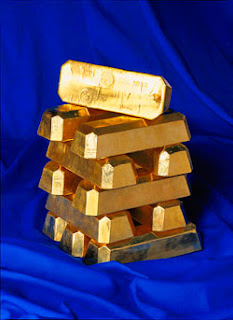This caught my eye – what is the real price of gold?
Will the Real Price of Gold Please Stand Up
 By Terry Coxon, Editor, Casey’s Gold & Resource Report
By Terry Coxon, Editor, Casey’s Gold & Resource Report
Gold is traded around the clock and in so many places and in so many forms, ranging from the abstractions of futures contracts to the solid tangibility of rings and bracelets, that it’s not clear what the “real” price is. The question is more than a matter of curiosity, since many retail coin and bullion shops quote selling prices in terms of “spot plus X%” or “spot plus $Y.” When you talk to a dealer, what exactly does he mean when he refers to “spot”?
Here are some of the prices that dealers refer to and that you may see reported in the media.
London fix. The five members of the London Gold Pool confer twice daily to determine the a.m. and p.m. price for gold. These are big players, so the fixings they announce have a quasi-official ring to them. But the London fixings determine the price only for trades that by pre-agreement are tied to the fixings. And each fixing has significance only at the instant it’s made. Trading between fixings runs on its own, independently of the preceding fix.
Comex spot contract price. The Comex is the busiest market for trading futures contracts in gold bullion. Each contract is for 100 ounces. Prices during the day represent actual trades taking place in a continuous, competitive auction. When, through the passage of time, a given contract reaches its delivery month, it becomes known as the “spot contract.” At that point, the party on the long side of the contact is free to pay for the physical and demand delivery, and the party on the short side of the contract is free to deliver the gold and demand payment. The possibility of insisting on physical delivery keeps the price on the spot contract tightly linked to the price on large transactions of physical gold between dealers.
New York dealer prices. If you visit www.kitco.com, you’ll find quotes, updated every 30 seconds, for the “New York Spot Price.” These reflect the bid and ask prices quoted by wholesale dealers for spot delivery. Not surprisingly, during Comex trading hours, they track the Comex price for the spot contract.
And there are other sources of prices. For many coin shops, A-mark Precious Metals, a bullion dealer in Santa Monica, is where they go when they have too much or too little of a given item. A-mark is their link to the wholesale market. You can find the A-mark gold price at www.amark.com.
None of these prices is “the” price. But they are all linked, because it’s so easy for gold to move from one market to another. What your local coin shop does has an effect on the wholesale dealer it trades with. And it has an effect on the Comex price, because the wholesale dealer watches that price from second to second and will buy or sell there to offset its position in physical gold. And the readiness of arbitragers to trade on small price differences assures that what happens on the Comex will have an effect on the London market.
Some players and some markets are much bigger than others, but none dominates. The price of gold doesn’t start at some central point and then ripple out to other markets. Instead, all the prices are determined together.
It’s an untidy situation. The practical implication of the untidiness is that when a dealer gives you a quote as spot plus this or spot minus that, you shouldn’t pay any attention to it, because the quote doesn’t tell you what “spot” means to that dealer. It may be, when you’re buying, that “spot” will mean the highest quoted price the dealer can point to when it receives your order. And even if a given dealer gives you an unambiguous statement as to how “spot” would apply to your transaction, you wouldn’t be able to compare with other dealers without finding out what “spot” means to them.
To find the best prices, step back from the spot plus or minus formulas and compare the spreads quoted by different dealers. Ask each dealer you are considering doing business with for both its bid and ask prices, without indicating whether you are a buyer or a seller. The dealer that quotes the lowest spread between bid and ask will probably give you the best price when it’s time to place an actual trade.
For years, “gold bugs” have suspected that the price of gold maybe manipulated – by governments, central banks, and their financial networks – and rumors on the Internet abound. But is it true or not? Casey editor Doug Hornig has left no stone unturned to get to the bottom of the matter. Read our brand-new, FREE report Is the Gold Price Manipulated? by clicking here.


